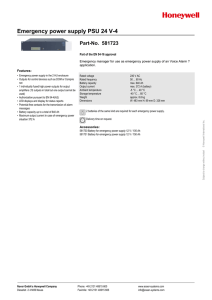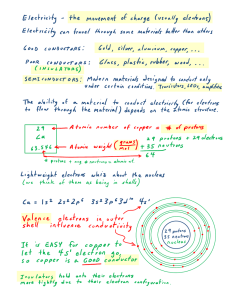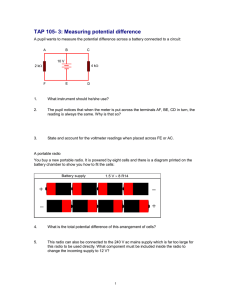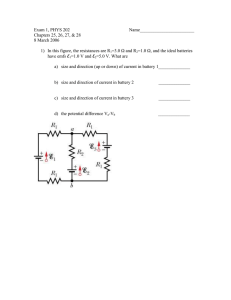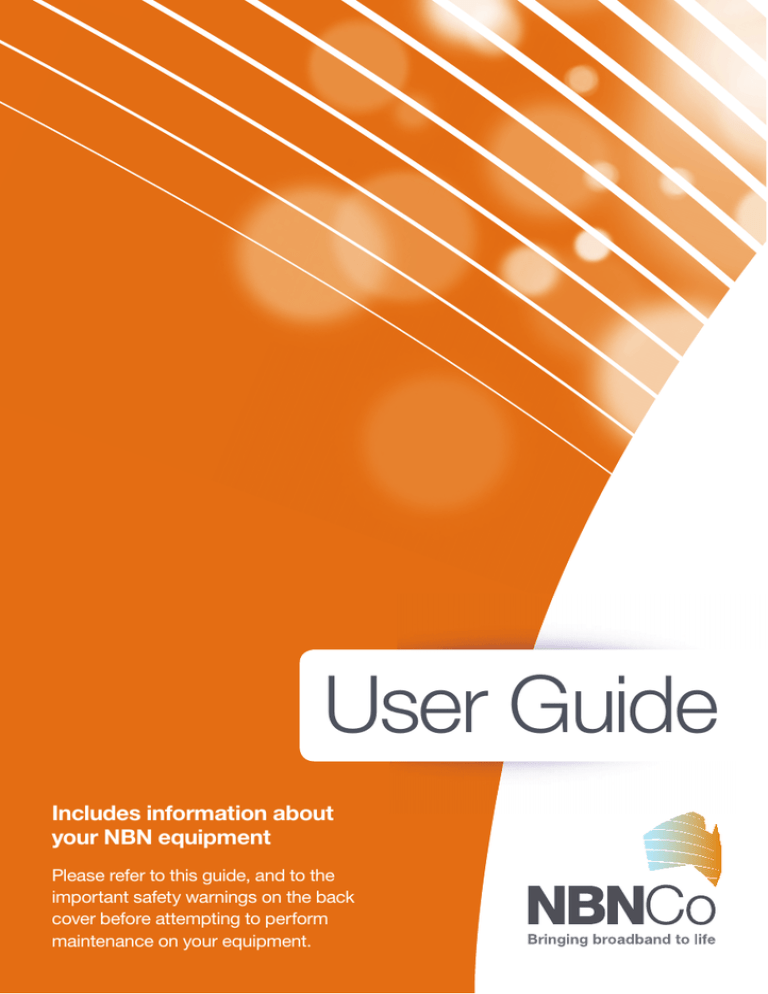
User Guide
Includes information about
your NBN equipment
Please refer to this guide, and to the
important safety warnings on the back
cover before attempting to perform
maintenance on your equipment.
1
CONTENTS
Quick start guide
4
Connecting the Network Termination Device to your own equipment
5
Maintaining your equipment
6
The Power Supply Unit
8
Instructions for replacing your backup battery
10
What to do if mains power fails
12
Power Supply Unit indicator lights and alarm sounds
13
Troubleshooting checklist
14
Network Termination Device indicator lights
16
Frequently asked questions
18
Important safety warnings
Back cover
YOUR NBN USER GUIDE
Congratulations on connecting to the National Broadband Network (NBN)
through your chosen service provider. Services delivered over the NBN have the
potential to transform every aspect of our lives including healthcare, education,
business and government services. Broadband, with its greater capacity for
traffic, is the means to unlock this potential and is a core infrastructure for
this century. Your new fibre optic connection gives you access to this vital
communications infrastructure.
This guide provides information on how to ensure your NBN connection
equipment stays in good working order. It also outlines what to do should your
system not work properly.
www.nbnco.com.au
2
NBN User Guide
3
CONNECTING THE NETWORK TERMINATION
DEVICE TO YOUR OWN EQUIPMENT
1 Connect compatible equipment to the Network Termination Device, using
the port designated for that service as directed by your telephone and
internet service providers.
2 If you have arranged a telephone service to be supplied through the voice
(UNI-V) port then your telephone should be connected to the designated
active voice (UNI-V) port on the Network Termination Device OR to your
existing telephone sockets. Your telephone and internet service providers
should give you information about which connection to use.
3 Check that the Network Termination Device is connected to the Power
Supply Unit.
4 Check that the Power Supply Unit is plugged into the mains power socket
and is switched on.
Power Supply Unit
Network Termination Device
SYSTEM
STATUS
BATTERY
POWER
REPLACE
BATTERY
ALARM
SILENCE
ALARM
SILENCE
BATTERY
EMERGENCY
USE
The back of your Network Termination Device will have a row of ports like this;
Voice (UNI-V) Ports
Data (UNI-D) Ports
Power
Fibre Optic
UNI-D
Once your equipment has been installed and checked, read these quick start
steps to begin enjoying your new NBN service.
UNI-V
QUICK START GUIDE
1
2
The two voice (UNI-V)
ports are to connect
telephones, using RJ-11
cables.
RESET
1
2
3
4
The four data (UNI-D) ports are to
connect data and in-band video
services, using Ethernet RJ-45 cables.
POWER
Port for
the power
cable from
your Power
Supply Unit
DO NOT
DISCONNECT
this cable unless
instructed to do so by
your service provider
If you have chosen a telephone service from your service provider to be delivered
through a voice (UNI-V) or data (UNI-D) port, your service provider will advise you
how to connect your telephone(s).
Your broadband services will be delivered through the data (UNI-D) ports on the
Network Termination Device. Your service provider(s) should advise you which
data (UNI-D) ports they have designated for your services, and how to connect
any necessary equipment for these services.
All the power and fibre optic cables required for the Network Termination Device
to operate will be supplied and connected by your installer. Any cables required
to connect your own internet or telephone equipment to the Network Termination
Device will need to be supplied by you or your service provider.
Fibre Wall Outlet
The Power Supply Unit ‘system status’ light will glow green.
IMPORTANT! Risk of injury
The Network Termination Device ‘power’ and ‘optical’ lights will both glow green.
Do NOT disconnect, tamper with or look into the laser light emitted
from the fibre optic cable. Doing this could damage your eyes.
All services that your telephone and internet service providers have agreed to
provide you with should now be working.
4
If you have followed the instructions from your service provider but your phone,
internet or other broadband connections are NOT working, or there are any red
or flashing lights on the Network Termination Device or Power Supply Unit, go
straight to the TROUBLESHOOTING guide on page 14.
NBN User Guide
5
MAINTAINING YOUR EQUIPMENT
Do not connect the Power Supply Unit to
the mains power using an extension cable,
double adapter, power board or any other
kind of secondary plug or socket.
The NBN equipment in your premises should require very little maintenance if
properly cared for.
Here are some important do’s and don’ts to ensure the Network Termination
Device and Power Supply Unit stay in good working order.
INSIDE YOUR PROPERTY
Keep the Power Supply Unit plugged directly
in to the mains power at all times and turned
on. If not plugged in and turned on, it will
revert to battery power (if installed) and will
quickly deplete the batteries which should be
reserved for emergencies. This will cause an
interruption to service when switched back on
and will eventually degrade the battery.
Do not cover or paint any part of the
equipment.
SYSTEM
STATUS
BATTERY
POWER
REPLACE
BATTERY
ALARM
SILENCE
ALARM
SILENCE
BATTERY
EMERGENCY
USE
Do not unplug the Power Supply Unit or
Network Termination Device unless you need
to replace the battery, are going away for an
extended period or are otherwise directed to
do so by your service provider.
Keep the Network Termination Device
plugged in to the Power Supply Unit. It will
not function without power from the Power
Supply Unit.
OUTSIDE YOUR PROPERTY
Check the indicator lights on the Power
Supply Unit regularly. If the system status is
not showing a green light or any other lights
are on, refer to the guide on page 13.
SYSTEM
STATUS
BATTERY
POWER
REPLACE
BATTERY
ALARM
SILENCE
ALARM
SILENCE
Ensure you know where any underground
cables are located before digging to avoid
accidental damage to them.
BATTERY
EMERGENCY
USE
Do not use water to clean the equipment.
SYSTEM
STATUS
BATTERY
POWER
REPLACE
BATTERY
ALARM
SILENCE
Keep branches and shrubs away from the
fibre optic cable and Premises Connection
Device.
ALARM
SILENCE
BATTERY
EMERGENCY
USE
6
NBN User Guide
7
THE POWER SUPPLY UNIT
Powering your NBN service
We have installed a Power Supply Unit, which draws power from your power point
to provide a steady 12V power supply to your Network Termination Device.
If your mains power fails, the Power Supply Unit will automatically switch to
its backup battery power. This will maintain a standard, non-powered telephone
service connected to an in-service voice (UNI-V) port ONLY.
It’s important to note that the backup battery will only power some phone
services using the voice (UNI-V) port for 2-3 hours following a mains power
failure. When approximately 50% of the battery charge has depleted the backup
battery will turn off to preserve the remaining charge for emergency use. This
should provide you with a total of approximately 5 hours of backup battery
power without mains power under typical circumstances to make calls over a
standard non-powered telephone connected to the voice (UNI-V) port. Extreme
cold (less than -1 degrees Celsius) may reduce the amount of time the battery
backup will last.
NOTE: The data (UNI-D) ports cannot provide any service while the Power
Supply Unit is operating on backup battery power. All devices connected to
data (UNI-D) ports such as modems and routers will be unable to access
the internet until mains power is restored. This means if you have an ‘internet
phone service’ connected to your data (UNI-D) port, it will not work on the
backup battery during a mains power failure. Even if the Power Supply Unit
has a properly functioning backup battery, cordless phones, alarms and other
devices that use mains power and do not have their own backup batteries will
not function if there is a power failure.
Please ask your service provider to clearly explain to you whether
and how your phone services will continue to operate without mains power.
The ability to make calls during a power failure (including to 000 Emergency
Services) depends on the service you choose from your service provider.
To ensure the battery backup for voice (UNI-V) phone services is ready and
working when you need it, you will need to maintain the Power Supply Unit and
backup battery following the advice given in this guide. Make sure you regularly
check the battery indicators, (see page 13 for a guide to indicator lights and
alarms) and charge and maintain the battery in the Power Supply Unit.
8
NBN User Guide
EMERGENCY CALLS CHECKLIST
To make and receive any telephone calls including 000 Emergency Service
calls, for a limited time during a power failure, you need to have all of the
following in place:
1. A service through your service provider that supports phone calls through the
voice (UNI-V) port;
2. The backup battery installed, charged and operating correctly (all instructions
are included in this guide); and
3. A telephone that does NOT require an external power source connected to one
of the voice (UNI-V) ports on your Network Termination Device.
Maintaining the mains power supply
The power cables and the power point used by the Power Supply Unit must be
maintained in a safe working condition.
Ensure that the Power Supply Unit is always plugged directly into a fixed power
point. The Power Supply Unit should never be connected using an extension cord,
double adapter, a power board or any other kind of secondary plug or socket.
Disconnecting the mains power supply will cause all data services delivered
through the Network Termination Device to stop working.
It is not advisable to switch off your
NBN equipment unless you are going
away for an extended period of time.
The power used by the system is
minimal, equivalent to a 10W light
bulb, and the life of the battery will be
reduced if the mains power is routinely
turned on and off.
SYSTEM
STATUS
BATTERY
POWER
REPLACE
BATTERY
ALARM
SILENCE
ALARM
SILENCE
BATTERY
EMERGENCY
USE
IMPORTANT!
If your Power Supply Unit is showing a red light next to the ‘REPLACE
BATTERY’ symbol then you need to
follow the steps on the next page to
replace your battery with a new one.
9
INSTRUCTIONS FOR REPLACING
YOUR BACKUP BATTERY
1. Purchase a new battery
You need to purchase a new battery of identical type and rating to the original,
which can be bought at most specialist battery retailers.
Specifications: 12V/7Ah (or 7.2Ah) AGM Sealed Lead Acid Battery (6 Cells) with
a 5+ year design life and flame retardant case.
STOP! Before going
any further please
read the Important
Safety Warnings on
the back cover
Typical
battery
dimensions
94 x 151
x 65mm
2. Remove the old battery
1.
C
Turn off at the power point and disconnect the Power Supply Unit from the
mains power.
2.
Open the front cover of the Power Supply Unit (A).
3.
Disconnect the red ‘+’ plug from the battery (B).
4.
Push the tabs holding the battery, one above and one below, outward and
then lift the battery out (C).
5.
Disconnect the black ‘–’ plug and remove battery (D).
SYSTEM
STATUS
SYSTEM
STATUS
SYSTEM
STATUS
BATTERY
POWER
BATTERY
POWER
BATTERY
POWER
REPLACE
BATTERY
REPLACE
BATTERY
REPLACE
BATTERY
ALARM
SILENCE
ALARM
SILENCE
ALARM
SILENCE
ALARM
SILENCE
ALARM
SILENCE
ALARM
SILENCE
BATTERY
EMERGENCY
USE
BATTERY
EMERGENCY
USE
BATTERY
EMERGENCY
USE
A
C
D
B
3. Install the new battery
1.
Reconnect the black ‘–’ plug to the new battery (E).
2.
Push the battery retaining tabs outward and insert the battery into the Power
Supply Unit (F).
3.
F
SYSTEM
STATUS
Reconnect the red ‘+’ plug to the new battery (G).
4.
Make sure the wires are not being pinched by the battery or the front cover.
5.
Close the front cover and plug the Power Supply Unit back into the power
point and turn it on.
6.
The new battery will take 24 hours to completely charge. Please retain the old
battery during this time unless its charge was completely exhausted.
7.
Please note, your broadband and/or telephone service delivered over the NBN
will be unavailable during and for up to 10 minutes after the battery is replaced.
E
SYSTEM
STATUS
BATTERY
POWER
BATTERY
POWER
REPLACE
BATTERY
REPLACE
BATTERY
ALARM
SILENCE
ALARM
SILENCE
ALARM
SILENCE
ALARM
SILENCE
BATTERY
EMERGENCY
USE
BATTERY
EMERGENCY
USE
F
G
PLEASE RECYCLE YOUR OLD BATTERY
Sealed Lead Batteries supplied by NBN Co are 100% recyclable.
Please don’t throw your old battery in the bin, take it to a recycling
facility, or ask about exchanging it where you purchased your new battery.
10
NBN User Guide
Pb
11
POWER SUPPLY UNIT INDICATOR LIGHTS
AND ALARM SOUNDS
WHAT TO DO IF MAINS POWER FAILS
The following displays are present on the front of the unit:
If your mains power fails, the Power Supply Unit will beep once and
automatically switch to its backup battery power. This will maintain a standard,
non-powered telephone service connected to an in-service voice (UNI-V) port
ONLY for approximately 2-3 hours under typical conditions.
Light ON
When approximately 50% of the battery charge has depleted the Power Supply
Unit will turn off the system, saving a further approximate 2-3 hours charge. This
saved charge can then be used to make emergency calls if needed.
As the battery depletes to approximately 50% charge (half capacity);
Light BLINKING
Light OFF
Normal
System fault
No mains power
and Power Supply
Unit is off
Using battery
No mains power
Battery charge low and
will soon be flat
Using mains power
or battery is flat
• The Battery Power indicator will flash and the Power Supply Unit will begin to
beep four times a minute,
Battery missing or battery has degraded
and should be replaced
Battery OK
• The beeps then stop and the Power Supply Unit will turn itself off to preserve
the remaining charge for use in case of an emergency.
Audible alarms silenced
Audible alarms
enabled
Audible alarms silenced
for 24 hours
To access remaining charge in emergencies
Press and hold the BATTERY EMERGENCY USE button
for two seconds until the Power Supply Unit beeps once
and all 4 lights flash. This will access the remaining
charge for a further 2-3 hours. Once activated you cannot
turn the BATTERY EMERGENCY USE button off again.
If the Power Supply Unit is working normally on mains power, the SYSTEM
STATUS light is green and the BATTERY POWER and REPLACE BATTERY
lights are off.
BATTERY
EMERGENCY
USE
Alarm sounds
The following list describes the different types of audible alarm sounds you
might hear:
After the battery is completely flat, the BATTERY
EMERGENCY USE button will not work again until mains
power has been restored and the battery has recharged.
ALARM
SILENCE
Alarm silence function
You can silence
audible alarm sounds
using the ALARM
SILENCE button.
Press and hold the
button to temporarily
silence or re-enable
the alarm sounds for
either 24 hours or
longer:
12
NBN User Guide
HOLD BUTTON FOR
TIME (SECONDS)
1
2
3
4
5
6
7
8
9
10
11
SILENCE FOR
24 HOURS
RE-ENABLE
ALARM
SILENCE FOR
24 HOURS+
KEEP HOLDING ALARM SILENCE BUTTON
RE-ENABLE
ALARM
KEEP HOLDING ALARM SILENCE BUTTON
= 1 BEEP
12
13
14
15
CAUSE
ALARM SOUND
POWER FAILURE
Loss of mains power
Beeps once
REPLACE BATTERY
Battery self test fails
Beeps once every 15 minutes
LOW BATTERY
Less than 50% remaining
Beeps 4 times every minute
AUDIBLE ALARM ON
Alarm function is enabled
Beeps twice when enabled
AUDIBLE ALARM OFF
Alarm function is disabled
Beeps once when disabled
13
TROUBLESHOOTING CHECKLIST
If any services provided through your Network Termination Device stop working
(e.g internet, IPTV or telephone) as a first step you make the following checks:
1. POWER CHECK
Is everything plugged in and turned on?
• Network Termination Device
• Power Supply Unit
• All cables and power points
• Your own equipment
If the lights on your Power Supply Unit do not match those shown in this diagram
then refer to the Power Supply Unit lights and indicators section of this guide on
page 13. If you still can’t identify the problem or the solution note down which
lights are glowing and then contact your service provider.
If the lights on your Network Termination Device do not match those shown
in this diagram then refer to the Network Termination Device indicator lights
troubleshooting section of this guide on page 16. If you still can’t identify the
problem or the solution it is a good idea to note down which lights are glowing
and then contact your service provider for assistance.
4. TELEPHONE CHECK
2. EXTERNAL FIBRE OPTIC CABLE CHECK
Has the fibre optic cable connection from the street
been damaged?
For example, a fallen branch may have damaged the cable. If you think this may
be the case, do NOT try to remove it or repair the cable yourself. Contact your
service provider immediately.
If you have a telephone service which plugs into the Network
Termination Device, check the following:
• Is the correct voice (UNI-V) port on the Network Termination Device connected
to your in-home wiring or a telephone?
• Is there a dial tone?
• Does your phone work if you plug it directly into the voice (UNI-V) port of the
Network Termination Device?
3. INDICATOR LIGHT CHECK
If your phone still does not work contact your service provider for assistance.
Check the indicator lights on your Power Supply Unit and
Network Termination Device.
5. INTERNET CHECK
Power Supply Unit
System Status light is ON
• If you have an NBN broadband connection, is it working?
• If you have an IPTV connection, is it working?
Network Termination Device
Power and Optical lights are ON
SYSTEM
STATUS
BATTERY
POWER
REPLACE
BATTERY
ALARM
SILENCE
ALARM
SILENCE
BATTERY
EMERGENCY
USE
14
NBN User Guide
15
NETWORK TERMINATION DEVICE
INDICATOR LIGHTS
ACTION
This means there is no power to your
Network Termination Device
Check the Power Supply Unit is plugged in and switched on and is connected
to your Network Termination Device. If there is still no power light contact
your service provider
RED
Your Power Supply Unit is operating
on backup battery power
If there is a mains power failure you will only have a phone service if it is
connected through your voice (UNI-V) port. You should refer to the Power
Supply Unit section of this guide immediately
GREEN
Your power supply is working normally
No action is required
GREEN
FLASHING
Your Network Termination Device is
starting up
No action is required. The flashing light should turn into a
green solid light shortly
OPTICAL INDICATOR
INDICATOR
MEANING
ACTION
OFF
Your Network Termination Device has
been disabled externally
Contact your service provider for further instructions
RED
Your Network Termination Device has
lost connection with the fibre network
Contact your service provider for further instructions
GREEN
Your Network Termination Device is
connected and working properly
No action is required
GREEN
FLASHING
This is normal and simply
means there is activity on
the network
No action is required
INDICATOR
MEANING
ACTION
OFF
Your Network Termination Device is
working but you have no devices
connected
No action is required
RED
Your Network Termination Device has
a fault and is not working normally
Contact your service provider for further instructions
GREEN
Your Network Termination Device is
working normally and is connected
No action is required
INDICATOR
ACTION
You do not have an active service
using this port at this time
This may simply mean that connected devices are not active at the moment.
If you are having difficulty with connected devices then contact your service
provider for further instructions
YELLOW
There is a 1Gbps device detected
on the network
No action is required
YELLOW
FLASHING
There is 1Gbps data activity
detected on the network
No action is required
GREEN
There is a 10/100Mbps device
detected on the network
No action is required
GREEN
FLASHING
There is 10/100Mbps data activity
detected on the network
No action is required
MEANING
ACTION
OFF
You do not have an active phone
service using this port at this time
No action is required
GREEN
One or more telephones are off the
hook (being used)
No action is required
GREEN
FLASHING
One or more telephones have been off
the hook for more than 1 hour
Check if someone in your household is using the phone, and if not check to
see if any of your handsets have been left off the hook by accident
MEANING
ACTION
OFF
Normal
No action is required
RED
Your Network Termination Device
has failed to download software
Contact your service provider for further instructions
GREEN
Your Network Termination Device is
successfully downloading software
No action is required
INDICATOR
UPDATE INDICATOR
MEANING
OFF
VOICE (UNI-V) INDICATORS
NBN User Guide
DATA (UNI-D) INDICATORS
MEANING
OFF
ALARM INDICATOR
POWER INDICATOR
16
INDICATOR
INDICATOR
17
FREQUENTLY ASKED QUESTIONS
What if I damage the equipment?
Can I plug the Power Supply Unit into a power board?
You are responsible for the Network Termination Device, Power Supply Unit, Battery
Backup, Premises Connection Device and the fibre optic cable on your property, just as
you are responsible for connection equipment for other services such as power, phone
and gas. If you accidentally damage any of the equipment or cable, you will need to
contact your service provider for repair and you may be charged for the repair.
No. For the Network Termination Device and Power Supply Unit to function correctly,
the power supply cord must be directly connected to its own fixed power point. Do not
connect the power supply cord to a double adapter, extension cord, power board, or any
other kind of secondary plug or socket.
Is the NBN fibre optic cable safe?
Fibre optic cables do not conduct electricity. However, there are other safety hazards
associated with handling fibre optic cable so you must never disconnect, tamper with or
look directly into the laser light emitted from the fibre optic cable. The laser light found
inside the fibre optic cabling is invisible (infrared) so you should assume there is laser light
present even if you cannot see it.
Is the NBN equipment installed in my home or premises safe?
The Network Termination Device and its power supply only use fixed cables. That means
they are not designed to nor intended to emit any wireless radiation. The Network Termination
Device and its power supply have been tested to ensure they meet Australian Safety and
Emission requirements in accordance with AS/NZS CISPR22 and AS/NZS 60950-1. These are
the standards that consumer appliances are generally required to comply with. The NBN Co
Network Termination Device and Power Supply Unit passed these tests.
The Network Termination Device has a laser warning label on it, in accordance with
Australian standards. This label is similar to the laser warning the standards require for
CD and DVD players, computer CD/DVD readers, laser pointing devices, laser ‘spirit’ level
tools etc. The Network Termination Device is designed to automatically turn off its laser
in case the optical fibre is pulled out or broken, and this happens within thousandths
of a second of a break occurring. NBN Co nevertheless recommends that people keep
away from fallen or broken cables as a precaution – because it’s not possible to easily
tell whether a fallen or broken cable is a safe NBN Co cable, or an unsafe cable from a
different utility.
Who do I contact for assistance?
Your service provider will help you if you have any questions or need to report a fault.
If I’m going away for a while can I unplug my service to save power?
Yes, if you are away for an extended period you can unplug your Power Supply Unit.
However you must also disconnect the Network Termination Device from the Power
Supply Unit to ensure it does not continue to operate on back up battery power. When
you return simply plug back in and the system will restart after a few minutes.
18
NBN User Guide
Can I connect other devices to the unused ports on the Network
Termination Device?
Each port on the Network Termination Device is reserved for a different service if you
choose to acquire services from more than one service provider. Ports that you’ve not
currently acquired services for will not be active. If you connect one of your devices to
an unused Network Termination Device port it will not have access to a service.
What if I want to move the Network Termination Device?
If you need to have equipment or cables relocated, contact your service provider who can
advise you of the cost and also arrange for a technician to move the equipment. When
considering relocating NBN equipment or cables you should bear in mind the following:
•
The equipment must be protected from water, steam or excessive heat.
•
The location must be well ventilated, near a dedicated power point and easy
for you to check the indicator lights.
•
The equipment must be positioned in a location away from busy areas and
protected from damage, where there is sufficient light to see if the device is
functioning correctly.
•
You are responsible for the relocation cost.
I have a monitored home or premises security system, will it work over
the NBN?
It is expected that most monitored security systems will operate over the NBN. However,
if you would like to use an existing system, you should check with your security provider
to ensure that your particular equipment and service is NBN-compatible.
Can I install in-home cabling myself?
Even though it is not required, if you choose to install permanent cabling through wall,
floor or ceiling cavities it must be done by an installer registered with an Australian
Communications and Media Authority (ACMA) accredited industry Registrar. ACMA is
the federal regulator responsible for the industry-managed cabler registration scheme.
Your service provider may be able to recommend a registered cable installer in your area.
Other temporary cabling such as plugging your own router or telephone into the Network
Termination Device can be done by yourself if you wish.
19
IMPORTANT SAFETY WARNINGS
Please read these notes carefully before attempting
to fit or replace a battery in your Power Supply Unit.
To reduce the risk of fire or electric shock, do not remove the
cover of the Power Supply Unit except to service the battery.
There are no user serviceable parts inside the Power Supply
Unit except the battery.
To avoid electric shock, switch off at the power point and
unplug the Power Supply Unit from the 240V AC power supply
before servicing the battery.
The battery can power hazardous live parts inside the
Power Supply Unit, even when the 240V AC power supply is
disconnected.
During a mains power failure the Power Supply Unit will only
power your voice (UNI-V) ports which have a connected phone
service from your service provider using a standard
non-powered phone. It will NOT power VoIP or ‘internet
phones’ connected to your data (UNI-D) port or any other mains
powered phones, alarms or other devices that do not have their
own backup batteries.
To prevent the risk of fire or electric shock, your Power Supply
Unit should be installed in a reasonably warm, dry indoor area,
free from condensation and excessive dust.
NBN-MKT-GDE-004 Dec 2011
Copyright © 2011 NBN Co Limited.
All rights reserved.
Not for general distribution.
20
NBN User Guide
www.nbnco.com.au

